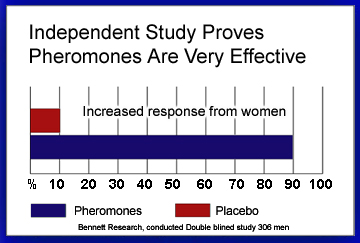Women’s Pheromones
How To Use Pheromones
Science has demonstrated that pheromones in fact attract the opposite sex. However, it seems most people are not sure on how to use pheromones to their full potential to atract the opposite sex. Here are some powerful tips that you can use to gain the sexual advantage using pheromones:
- 1. The best places to apply pheromones include the neck, wrists, chest, forearms and behind the ears. Using multiple areas will give you the most results as your body will release more natural pheromones.
- 2. Use unscented soap to maximize your exposure of pheromones.
- 3. Be approachable and friendly. Don’t just sit back and wait for the miracle to happen, go and mingle so you can maximize your potenial to score with pheromones.
- 4. Less is more. One to two sprays or dabs is usually all you need to utlize the powerful effects of human pheromones.
- 5. Give yourself 30 days. You never know who you are going to meet!
Featured on CNN, CNBC, Discover, WebMD, BBC News, NY Times and ABC, pheromones have been used by millions of people to dramatically increase sex appeal, get more dates and become the center of attention.
- 1. Always choose a pheromone product with a highest pheromone concentration for the best results.
- 2. Buy from reputable manufacturer to ensure high quality and most effective ingredients.
- 3. Look for 30 day money back guarantee to fully evaluate the effects of pheromones.
Comparison Table Chart

Benefits Of Pheromones
So, what are some of the benefits of pheromone colognes? If so many brands are available, the promised results must be pretty amazing, right? Let’s take a look. Pheromones are reported to do the following * :
- Make you more sexually attractive
- More smiles and eye contact from the opposite sex
- Boost your self-confidence
- Give you the extra edge in business
- Improve your sex life, increase passion
- Encourage the opposite sex to talk to you
- Put the opposite sex at ease
- Provide a spark for you current relationship
- More dates and more sex
References:
Kohl, J., Atzmueller, M., Fink, B. & Grammar, K. Human Pheromones: Integrative euroendocrinology & Ethology. NEL 22, 309-321.(2001) Karlson P., Luscher M. (1959). "Pheromones: a new term for a class of biologically active substances". Nature 183 (4653): 55-56. doi:10.1038/183055a0. PMID 13622694.